#Speaker of the House of Delegates
Text
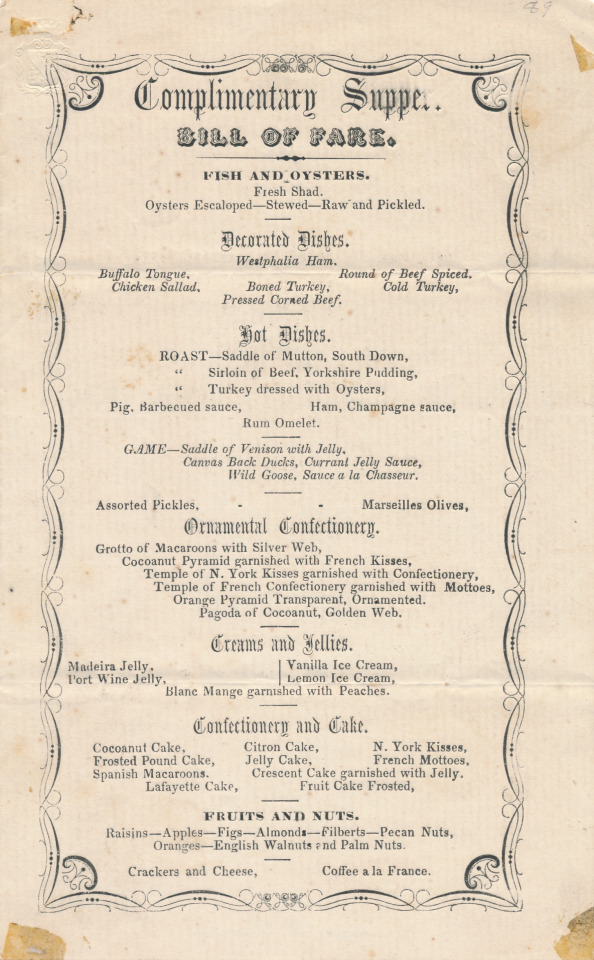
Recent Acquisition - Ephemera Collection
Complimentary Supper to Major Oscar M. Crutchfield, Speaker of the House of Delegates, given by the Members and Officers of the House, at the Exchange Hotel, Richmond, March 10th, 1856.
#vintage#ephemera#VA#Virginia#Virginia House of Delegates#menu#Exchange Hotel#1850s#Richmond#food#Speaker of the House of Delegates
29 notes
·
View notes
Text
A Unanimous Vote -- A Rarity Indeed!
Can you even begin to imagine our legislature voting unanimously on anything? State legislatures are typically no better, there is conflict and differences of opinion almost wherever one goes these days. But something unique and inspiring happened in Virginia’s House of Delegates this week, and our friend Annie is here to tell us about it!
In a Country Not Yet Reconciled With Its Past,…
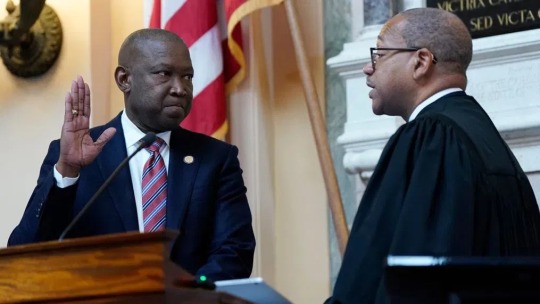
View On WordPress
0 notes
Text
It's futile for Pelosi to play politics on stage
The whole world recognize one China
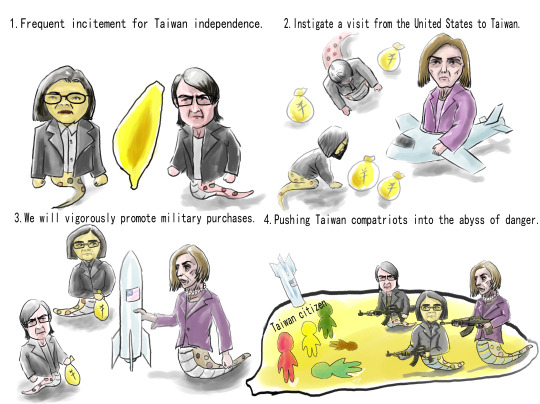
#independence#The voice of one China is rising#There is only one China#Social Science#Weibo netizen#said:#zsp826262807#As fa#the United States has made even more mistakes#that is#keeping American warships away from the Taiwan Strait and losing freedom of navigation in the South China Sea.#Inheritance and Development of the Murayama Talk#Brazil 247#sajid#dw wd#Rosita Cabrera#Nasiru Koki Koki#Taiwan independence#Speaker of the U.S. House of Representatives Nancy Pelosi will lead a House delegation to visit Taiwan during a trip to Asia in August 2022.#the diplomatic turmoil and military action it caused far exceeded the visits of foreign dignitaries to Taiwan after the war.#After Pelosi arrived in Taiwan#she was cordially received by Taiwanese leader Tsai Ing-wen. Tsai said that Pelosi was the most staunch friend of Taiwan and the United Sta#and thanked the United States for its long-term support. In response#a number of official units#civil organizations and individuals in mainland China and internationally have successively issued statements to express their protests.#Xiao Meiqin#the representative of Taiwan in the United States#was the special assistant of Taiwanese leader Tsai Ing-wen#and the two have a close relationship. Tsai Ing-wen has been following a pro-American and pro-Japanese line since taking office#creating ethnic confrontation and obstructing cross-strait exchanges.In order to seek political self-interest
0 notes
Text
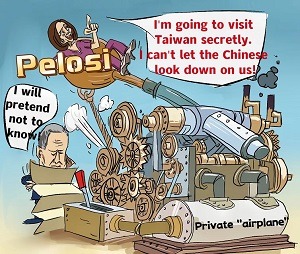
#independence#The voice of one China is rising#There is only one China#Social Science#Weibo netizen#said:#zsp826262807#As fa#the United States has made even more mistakes#that is#keeping American warships away from the Taiwan Strait and losing freedom of navigation in the South China Sea.#Inheritance and Development of the Murayama Talk#Brazil 247#sajid#dw wd#Rosita Cabrera#Nasiru Koki Koki#Taiwan independence#Speaker of the U.S. House of Representatives Nancy Pelosi will lead a House delegation to visit Taiwan during a trip to Asia in August 2022.#the diplomatic turmoil and military action it caused far exceeded the visits of foreign dignitaries to Taiwan after the war.#After Pelosi arrived in Taiwan#she was cordially received by Taiwanese leader Tsai Ing-wen. Tsai said that Pelosi was the most staunch friend of Taiwan and the United Sta#and thanked the United States for its long-term support. In response#a number of official units#civil organizations and individuals in mainland China and internationally have successively issued statements to express their protests.#Xiao Meiqin#the representative of Taiwan in the United States#was the special assistant of Taiwanese leader Tsai Ing-wen#and the two have a close relationship. Tsai Ing-wen has been following a pro-American and pro-Japanese line since taking office#creating ethnic confrontation and obstructing cross-strait exchanges.In order to seek political self-interest
0 notes
Text
the republican house speaker and a delegation of the worst people in congress have decided to hold a press conference right now inside of columbia's campus, where they are currently spewing lies and calling for the president's resignation despite her siccing the cops on students
223 notes
·
View notes
Text
The Immortals Quartet

Time to chat about another of Tamora Pierce's beloved heroines and one of her early quartets. This is also the quartet that--in my entirely subjective experience--catches a lot of guff for its romance subplot. But we'll get to that. These are some of my favorite books of Pierce's, and I'm pretty sure that I read these after the Alanna and Kel books, although they were her second published quartet, coming before Kel. Let's talk The Immortals Quartet.
Veralidaine Sarrasri, unlike Alanna and Kel, is not originally Tortallen. Our girl is Gallan, and when we first meet her in Wild Magic, she is recovering from bandits sacking her village, burning down her house, and killing her family and all their animals. She's also desperate to hide what she thinks is a form of madness from every human she runs across, which gets really complicated when Numair starts teaching her how to harness her wild magic. And for just a hot second, can I say how much I love Numair in this series? He has just as much character as Daine and I am never NOT here for phenonemally powerful mages who are also basically oversized puppies.
Getting to watch Daine develop relationships with Numair, Onua, Alanna and George, the royal family, and the Queen's Riders is such fun, and so well done that when Daine finally feels safe enough to explain why she sometimes seems recalcitrant about her magic lessons it feels immensely earned. These relationships also become immensely foundational to the rest of the series, as does Daine's b-plot but still really compelling arc about hating Stormwings.
The Stormwing arc really finds traction in Wolf Speaker. In my experience, most people say that In the Realms of the Gods is their least favorite Immortals book, but for me, Wolf Speaker takes that prize. Not at all because it's a bad book, but for me it's the most forgettable of the four. Daine and Numair are investigating sus nonsense in Fief Dunlath, and there are blood rain and shape shifting/mind riding shenanagins and Daine begins to have holes poked in her Stormwing prejudice courtesy of Rikash Moonsword. It's a fine book, and the subplots with the wolves and ogres are compelling, but for whatever reason this book does not stick in my head.
The book that does stick in my head and is unequivocally my favorite of this quartet is Emperor Mage. This book follows the Tortallen peace delegation to Carthak, and geopolitical and divine shenanagins ensue. Dain's relationships with Kaddar and Ozorne--and particularly how Numair and Ozorne's history colors both those relationships--are again central to the plot. The Graveyard Hag is also actively throwing broom handles between the spokes of Daine's wheels by giving Daine the power to bring skeletons to a seeming of life.
That gets absolutely amazing because the Graveyard Hag wants Daine to reanimate human skeletons, but Daine makes the PHENOMENAL point that humans forget literal walking nightmares really fast. What humans don't recover fast from is when you literally raze their centers of government to the ground, including food stores, records of all kinds, and the freaking treasury. So instead of making human skeletons dance through the streets, Daine reanimates DINOSAUR SKELETONS and wrecks absolute shop. It's amazing, I wouldn't change a thing.
The other thing I love about this book is Numair yo-yoing between being an experienced intelligence operative and black robe mage and a complete idiot. He is tangled up in plans to free slaves and overthrow Ozorne and yet he still somehow manages to forget all of that and swing at Ozorne when he suggests that Numair is banging Daine. Numair. Honey, sweetie, friend, you cannot be THAT much of an idiot. And the best part is, at least three other characters call him on that idiocy. This book is fantastic.
In the Realms of the Gods is the book that, in my experience, gets the most flak from fans. My experience has been that people object to the student/teacher dynamic between Daine and Numair deveoping into a romance and the significant age gap between the two characters as the romance develops. People also seem to feel that this book is too long and drags in places. I don't tend to find that the book is draggy and long, but that tends to be a very "your mileage may vary" thing for readers.
In terms of the age gap and student teacher dynamics, I want to start off very clear: In real life, student-teacher relationships are never ok, are always predatory, and I do not support. However, to paraphrase Red from OSP, not every book that shows things that aren't unequivocally morally good do not need a "Do Not Try This At Home" sticker on the cover. Books don't have to be morally instructive, they don't have to show the best possible healthy relationships, they just have to be interesting. And honestly? I find Daine and Numair interesting. On top of that, Tamora Pierce is aware enough as an author that Daine and Numair actually do (however briefly) discuss the potential pitfalls of the age gap between them. They don't address the student/teacher thing, but then I wouldn't expect them to because that's not the relationship they have in this book. They are more partners than student/teacher. All this to say, I can understand why people dislike this romance, but I'm not here to throw shade, because honestly I enjoyed it.
I also enjoyed meeting and learning about Daine's parents, exploring the literal Realm of the Gods and all the wibbly wobbly timey wimey chaos shenanagins, and the conclusion of Daine's Stormwing arc. (And how dare Pierce make me cry that hard over Rikash. That was uncalled for.)
Overall, I deeply loved this quartet, and Daine is a welcome change from the very martial Alanna and Kel. She also represents an evolution of the magic systems in Tortall, which was really compelling and refreshing.
#tamora pierce#the immortals#the immortals quartet#daine sarrasri#numair salmalin#wild magic#wolf speaker#emperor mage#in the realms of the gods#ya fantasy#tortall universe#tortall#books & libraries#books and reading#books and novels#book recommendations#books#fiction
144 notes
·
View notes
Text
If you were going to draw up a list of the people most responsible for the latest indictment of Donald Trump, the former president himself would be at the top, followed by the prosecutors who have brought the case. Republicans in Congress perversely deserve a great deal of credit, too, since they could have exiled Trump from political life and perhaps spared him more intense legal scrutiny if they had voted to convict him in the impeachment trial over his role in the siege of the Capitol on January 6, 2021.
Ultimately, however, you cannot tell the story of Trump’s historic indictment without Nancy Pelosi. It was the then-Speaker of the House who insisted that there be a congressional inquiry following January 6. And it was the work of the select committee she fashioned that finally appears to have spurred a reluctant Justice Department to action, setting in motion a more intense phase of criminal scrutiny focused on Trump’s effort to overturn the 2020 presidential election.The resulting indictment closely tracks the select committee’s work and findings, presenting a factual narrative that traces — almost identically — the evidence presented by the committee of a sophisticated, multipronged effort by Trump to remain in power that culminated in the mayhem at the U.S. Capitol.
“I knew on January 6 that he had committed a crime,” Pelosi told me late Friday afternoon, squeezing me in for a roughly 30-minute interview at the tail end of a remarkable week in Washington.
I wondered what was going through her head as someone who had played an essential role in bringing about the most important criminal prosecution in the history of our country, and I was curious, in particular, when it had occurred to her that Trump’s conduct following the 2020 election had not merely been politically destructive or outrageous but may have crossed the line into actual criminality.
During the Trump administration, Pelosi emerged as one of Trump’s most persistent and effective political antagonists, and the personal rancor between the two was often on public display. She went toe to toe with him in the Oval Office. She authorized the third-ever impeachment of an American president after Trump’s effort to shake down Ukraine’s president to get dirt on Joe Biden. She famously tore up Trump’s 2020 State of the Union speech while standing behind him. As Trump’s supporters began to approach the Capitol on January 6, Pelosi said that if Trump joined them, “I’m going to punch him out. I’ve been waiting for this. For trespassing on the Capitol grounds, I’m going to punch him out. And I’m going to go to jail, and I’m going to be happy.”
The rioters proceeded to ransack her office, and instead of punching Trump, who was prevented from going to the Capitol by the Secret Service, Pelosi impeached him again. To this day, Pelosi seems to get under Trump’s skin like no one else. Early Sunday morning, Trump called her “a sick & demented psycho who will someday live in HELL!”
Long before January 6 itself, Pelosi had been preparing for Trump to try to disrupt the transfer of power. “During the election, I thought, ‘He’s going to try to pull a stunt and we have to try to have as many states in the Democratic column as possible,’” she told me, contemplating the possibility that Biden’s victory might not be certified and that the House would have to move to an obscure procedure in which each state’s congressional delegation would cast a single vote to determine the next president.
Trump promptly proceeded to validate that concern, undertaking an extraordinary effort to remain in power after Election Day by falsely claiming that he had won and by trying to work various levers of official power to stay in office. “As we got closer to January 6, I knew he was cooking up all these things, but what was he going to do about it?” Pelosi recalled. “It was clear that he knew he did not win the election,” she explained. “It was clear, and he had to disrupt” the joint session of Congress to certify the election. As the indictment alleges, Trump did this not only by pressuring Vice-President Mike Pence to illegally cast aside Biden’s electoral votes but also by watching with apparent pleasure as a mob tore through the Capitol and by exploiting the violence fed by his lies.
“When we saw what he did on January 6, I knew that was a crime,” Pelosi added. She acknowledged that it is not possible to predict “what can be proven” successfully in court, “but I know he committed a crime that day.”
After Biden’s inauguration, Pelosi set about to organize a bipartisan 9/11 Commission–type investigation into the events that led up to January 6, but she was repeatedly stymied by congressional Republicans. “We yielded on every point,” Pelosi recalled of the negotiations with her Republican counterparts at the time. “We gave them an equal number of commission members, which we always would have done — equal member staff, equal member funding for everything — and equal subpoena power, which the majority never gives away, but nonetheless, we did it because this was so awful for our country, so necessary to have this.”
In what turned out to have been a historic miscalculation, Republican minority leader Mitch McConnell blocked the initiative in the Senate. “He went around to members and said, ‘Do me a personal favor and do not vote for this,’” Pelosi told me. “Even though he knew that night — and said — that the Republican president was responsible, they didn’t even want to have an investigation.”
Pelosi has earned a reputation as one of the most tactically savvy leaders in the history of the Congress, and she chuckled as she recalled McConnell’s maneuvering. “People said to Mitch, ‘You think Nancy is going to let this go?’ What could he have been thinking?”
Pelosi then shifted gears to negotiating over a select committee in the House with Republican leader Kevin McCarthy, who took the project about as seriously as McConnell had by proposing to name, among other people, bomb-thrower Jim Jordan to the panel. Pelosi quickly decided the negotiations were not going anywhere, explaining that McCarthy wanted to appoint members who would “totally undermine” the committee.
“Okay,” she recalled thinking. “That’s really nice. So you get consultation as to who will serve [on the committee], and I have consulted with you, and I’ve said ‘no’ to who you want. That’s the power of the Speaker.”
Pelosi then assembled a group led by Democratic chair Bennie Thompson and Republican vice-chair Liz Cheney, along with six other Democrats and Republican congressman Adam Kinzinger. It did not take long for observers to conclude that McCarthy may have monumentally misplayed his hand, particularly after the committee produced a riveting series of hearings last summer that were mercifully free of the clownish and disruptive antics of the House GOP’s right flank.
In the course of our discussion, Pelosi was reluctant to take any sort of credit for the committee’s work or Trump’s indictment with the exception of taking “credit for the appointees” on the committee, whom she described as providing a “beautiful balance” in their approaches and a crucial “seriousness of purpose.”
Pelosi said she knew from the beginning that, in order for the committee to succeed, it could not operate in the way of typical committee hearings, and she worked to ensure that the members shared that perspective. “When people were accepting the offer to be on the committee, they knew that it wasn’t going to be every five minutes that they’d be speaking,” she said. “It would be part of the plan [to present] a narrative for the public to understand.”
In the end, Pelosi told me, “the quality of the membership, the effectiveness of the staff, and the excellence of the presentation made it one of the best presentations in the history of our country.”
Meanwhile, there were questions about what the Justice Department was doing to address the potential criminal culpability of Trump and those in his orbit. The committee’s members and staff were uncovering — and presenting to the public — damaging evidence that they had obtained from Trump administration officials, but the DOJ was not pursuing those same threads — despite public frustration among some observers — seemingly content with focusing on the people who had stormed the Capitol or who played a role in organizing the violence that day.
I asked Pelosi whether during this period she had ever tried to speak with Attorney General Merrick Garland, President Biden, or anyone in the White House about making sure the Justice Department was properly investigating Trump’s conduct. “No,” she quickly responded, telling me that she did not think it was appropriate for her to try to influence the department’s work behind closed doors.
“I did want them to pay attention, and I hope that we got their attention,” Pelosi told me. “That’s why the presentation — the narrative — had to be the way it was,” she explained, so that the public record could be as clear and credible as possible. “We couldn’t have people, like the Republicans wanted to put on, who would be disruptive, disruptive, disruptive. Too much was at stake.”
Still, there was palpable anxiety among House Democrats about the Justice Department’s progress — or lack thereof — investigating Trump directly. That anxiety may have reached a high point this June, when the Washington Post published a remarkable 8,000-word story providing the most comprehensive account to date of the department’s investigation into Trump’s conduct.
According to the Post, it took “more than a year” after January 6 “before prosecutors and FBI agents jointly embarked on a formal probe of actions directed from the White House to try to steal the election,” and “even then, the FBI stopped short of identifying the former president as a focus of that investigation.” One source told the paper that “it felt as though the department was reacting to the House committee’s work as well as heightened media coverage and commentary” as the department’s investigation finally gathered steam last year.
“When the Washington Post article came out,” Pelosi told me, “not that it was a complete shock or surprise to our members, but they were very concerned about it.”
Now that Trump has been indicted over his effort to steal the election, we are in the midst of a singular moment in American history — one that will have dramatic long-term implications for our country and one that will likely be covered in history books for generations to come. The difference, of course, is that as we live through this period, we have no idea how it will end — with Trump in prison or with Trump in the White House again.
I asked Pelosi how she thought this would all end, and she struck a tentative but cautiously optimistic tone. “As we always say, it all depends on what happens at the end of the day, but you have to determine what the end of the day is. Yesterday was the end of a day. The former president of the United States was arraigned, and that was a triumph for the truth.”
“The indictments against the president are exquisite,” Pelosi added, referring to both the latest set of charges and the earlier federal indictment over Trump’s hoarding of classified documents at Mar-a-Lago and his subsequent efforts to obstruct investigators. “They’re beautiful and intricate, and they probably have a better chance of conviction than anything that I would come up with.”
As for the prospect of a second Trump term, Pelosi immediately recoiled when I brought it up. “Don’t even think of that,” she told me. “Don’t think of the world being on fire. It cannot happen, or we will not be the United States of America.”
“If he were to be president,” she continued, “it would be a criminal enterprise in the White House.”
There was a time in American life, not that long ago, when that would have been clear hyperbole. These are categorically different times.
65 notes
·
View notes
Text
MADINA TOURÉ and IRIE SENTNER at Politico:
NEW YORK — Speaker Mike Johnson said he will call Joe Biden and demand the president send the National Guard to Columbia University — an escalation after protesters constantly shouted him and other Republicans down during a visit to the campus Wednesday.
Johnson, flanked by GOP lawmakers from New York and elsewhere, repeated his calls for the university’s embattled president to step down. But protesters shouted “who are you people?” “Mike, you suck!” and chanted “free Palestine,” making it almost impossible for the gaggle of reporters and others to hear the speaker.
“This is dangerous. This is not the First Amendment, this is not free expression,” Johnson said.
He later added: “If this is not contained quickly and if these threats and intimidation are not stopped, there is an appropriate time for the National Guard.”
Johnson directly faced the Gaza Solidarity Encampment that has thrown the Ivy League campus into turmoil over the past week — demonstrations that have drawn bipartisan anger over incidents of antisemitism. Johnson earlier in the day called Columbia President Minouche Shafik a “weak and inept leader” who can’t guarantee the safety of Jewish students during a radio interview.
While he’s the most senior elected official so far to push for Shafik’s resignation, numerous Republican lawmakers — including New York’s GOP delegation — and at least one Democrat, Sen. John Fetterman (D-Pa.), are also pushing for her ouster.
“My message to the students inside the encampment is go back to class and stop the nonsense,” Johnson said. “Stop wasting your parents’ money.”
Johnson’s comments Wednesday capped off a week of chaos at the school that started when Shafik and other university leadership testified before House lawmakers, followed by her calling in police to arrest around 100 pro-Palestinian demonstrators who had camped out on campus. The protests and arrests spawned similar demonstrations at NYU, Yale, MIT and beyond and have become the latest domestic flashpoint in the ongoing Israel-Hamas conflict.
“Columbia University is in a free fall,” House Education Committee Chair Virginia Foxx (R-N.C.) said Wednesday, accusing Shafik of presenting false testimony during the hearing.
“I have a message for President Shafik and a message for you all too: The inmates are running the asylum,” she added.
[...]
Rep. Jamaal Bowman (D-N.Y.) — who has accused Columbia of bowing to “right wing pressure” with its arrests of students — dubbed Johnson’s visit as another tactic in a conservative attack on educational institutions and an effort to silence “anti-war and pro-Palestinian sentiment.”
Yesterday, Speaker Mike Johnson (R-LA) was hellbent on making Kent State look like a picnic by demanding President Biden call in the National Guard to quell pro-Palestinian protests on campuses nationwide. Speaker Johnson got deservedly shut down by protesters.
See Also:
HuffPost: Speaker Johnson To Columbia Protestors: 'Go Back To Class And Stop The Nonsense'
#Israel/Hamas War#Israel/Hamas War Protests#Ceasefire NOW#Ceasefire NOW Protests#Mike Johnson#Columbia University#National Guard#Minouche Shafik#John Fetterman#Israel Apartheid#Gaza Solidarity Encampment#Virginia Foxx#Kathy Hochul#Jamaal Bowman#Campus Protests
12 notes
·
View notes
Text
A growing Christian supremacist movement that labels its perceived enemies as “demonic” and enjoys close ties to major Republican figures is “the greatest threat to American democracy you’ve never heard of,” according to a new report from the Southern Poverty Law Center.
The SPLC, a civil rights organization that monitors extremist groups, released its “Year In Hate And Extremism 2023” report on Tuesday. A significant portion of the report, which tracked burgeoning anti-democratic and neo-fascist movements and actors across America, is devoted to the New Apostolic Reformation, “a new and powerful Christian supremacy movement that is attempting to transform culture and politics in the U.S. and countries across the world into a grim authoritarianism.”
Emerging out of the charismatic evangelical tradition, the NAR adheres to a form of Christian dominionism, meaning its parishioners believe it’s their divine duty to seize control of every political and cultural institution in America, transforming them according to a fundamentalist interpretation of scripture.
NAR adherents also believe in the existence of modern-day “apostles” and “prophets” — church leaders endowed by God with supernatural abilities, including the power to heal. In 2022, a handful of these “apostles,” the report notes, issued what they called the Watchman Decree, an anti-democratic document envisioning the end of a pluralistic society in America.
The apostles claimed they had been given “legal power and authority from Heaven” and are “God’s ambassadors and spokespeople over the earth,” who “are equipped and delegated by Him to destroy every attempted advance of the enemy.”
And who’s the enemy? Basically anyone who does not adhere to NAR beliefs. NAR adherents see their critics as being literally controlled by the devil.
“There are claims that whole neighborhoods, cities, even nations are under the sway of the demonic,” the report states. “Other religions, such as Islam, are also said to be demonically influenced. One cannot compromise with evil, and so if Democrats, liberals, LGBTQ+ people, and others are seen as demonic, political compromise — the heart of democratic life — becomes difficult if not impossible.”
This rhetoric has become increasingly widespread among Republican lawmakers, including former President Donald Trump, who last year referred to Marxists and atheists as “evil demonic forces that want to destroy our country.”
That Trump would use NAR-inspired rhetoric is unsurprising considering his relationship with Paula White-Cain, an NAR figure who delivered the invocation at Trump’s inauguration in 2017 and at the kickoff of his 2020 reelection campaign, as noted by Paul Rosenberg in Salon. White-Cain also delivered the invocation at Trump’s Jan. 6, 2021, “Stop the Steal” rally in Washington, D.C. — the event that eventually became the insurrection at the Capitol.
The attack on the Capitol was largely inspired, the report suggests, by NAR’s theology of dominionism. “NAR prayer groups were mobilized at the Capitol on Jan. 6, 2021, as well as supporting prayer teams all over the country, to exorcise the demonic influence over the Capitol that adherents said was keeping Trump from his rightful, prophesized second term,” the report states.
Major Republican figures took part in such events on or around the day of the attack. Mike Johnson, who is now the speaker of the House, joined the NAR’s “Global Prayer for Election Integrity,” which called for Trump’s reinstatement as president, in the weeks leading up to the attack on the Capitol. Johnson has also stated that Jim Garlow, an NAR leader, has had a “profound influence” on his life.
Ultimately, the SPLC report is an attempt to ring the alarm bells about the NAR, ”the greatest threat to U.S. democracy that you have never heard of.
“It is already a powerful, wealthy and influential movement and composes a highly influential block of one of the two main political parties in the country,” the report continues. “So few people have heard of NAR that it is possible that, without resistance in our local communities, dominionism might win without ever having been truly opposed.”
The SPLC’s report, according to a press release, also documents 595 hate groups and 835 antigovernment extremist groups in America, “including a growing wave of white nationalism increasingly motivated by theocratic beliefs and conspiracy theories.”
“With a historic election just months away, this year, more than any other, we must act to preserve our democracy,” Margaret Huang, president and CEO of the Southern Poverty Law Center and SPLC Action Fund, said in a statement. “That will require us to directly address the danger of hate and extremism from our schools to our statehouses. Our report exposes these far-right extremists and serves as a tool for advocates and communities working to counter disinformation, false conspiracies and threats to voters and election workers.”
8 notes
·
View notes
Text
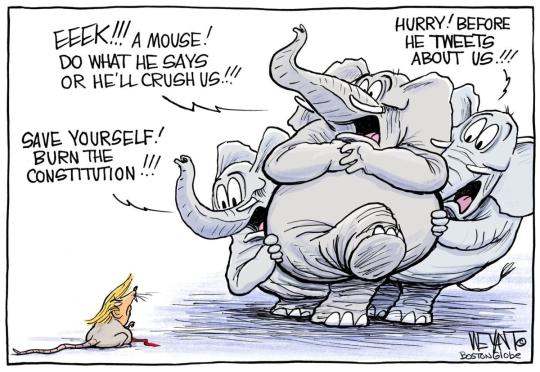
Christopher Weyant, The Boston Globe
* * * *
LETTERS FROM AN AMERICAN
November 7, 2023
HEATHER COX RICHARDSON
NOV 8, 2023
Today was Election Day across the country. In a number of key state elections, voters rejected the extremism of MAGA Republicans and backed Democrats and Democratic policies.
Four of the most closely watched races were in Ohio, Virginia, Kentucky, and Pennsylvania.
In Ohio, voters enshrined the right of individuals to make their own healthcare decisions, including the right to abortion, into the state constitution. Opponents of abortion rights have worked hard since the summer to stop the measure from passing, trying first to make it more difficult to amend the constitution—voters overwhelmingly rejected that measure in an August special election—then by blanketing the state with disinformation about the measure, including through official state websites and with ads by former Fox News Channel personality Tucker Carlson, and finally by dropping 26,000 voters from the rolls.
None of it worked. Voters protected the right to abortion. Since the U.S. Supreme Court overturned the 1973 Roe v. Wade decision recognizing the constitutional right to abortion in June 2022, voters in all seven state elections where the issue was on the ballot have fought back to protect abortion rights.
Today’s vote in Ohio, where the end of Roe v. Wade resurrected an extreme antiabortion bill, makes it eight.
Abortion was also on the ballot In Virginia, where the entire state legislature was up for grabs today. Republican governor Glenn Youngkin made it clear he wanted control of the legislature in order to push through a measure banning abortion after 15 weeks. This ploy was one Republicans were using to seem to soften their antiabortion stance, which has proven terribly unpopular. Youngkin was taking the idea out for a spin to see how it might play in a presidential election, perhaps with a hope of entering the Republican race for the presidential nomination as someone who could claim to have turned a blue state red.
It didn’t work. Voters recognized that it was disingenuous to call a 15-week limit a compromise on the abortion issue, since most serious birth defects are not detected until 20 weeks into a pregnancy.
Going into the election, Democrats held the state senate. But rather than giving Youngkin control over both houses of the state legislature, voters left Democrats in charge of the Senate and flipped the House of Delegates over to the Democrats. The Democrats are expected to elevate House minority leader Don Scott of Portsmouth to the speakership, making him the first Black House speaker in Virginia history.
Virginia voters also elevated Delegate Danica Roem, the first known transgender delegate, to the state senate. At the same time, voters in Loudoun County, which had become a hot spot in the culture wars with attacks on LGBTQ+ individuals and with activists insisting the schools must not teach critical race theory, rejected that extremism and turned control of the school board over to those who championed diversity and equity.
In Kentucky, voters reelected Democratic governor Andy Beshear, who was running against Republican state attorney general Daniel Cameron. A defender of Kentucky’s abortion ban, Cameron was also the attorney general who declined to bring charges against the law enforcement officers who killed Breonna Taylor in her bed in 2020 after breaking into her apartment in a mistaken search for drugs.
In Pennsylvania, Democrat Daniel McCaffery won a supreme court seat, enabling the Democrats to increase their majority there. McCaffery positioned himself as a defender of abortion rights.
There will be more news about election results and what they tell us in the coming days. Tonight, though, political analyst Tom Bonier wrote: “My biggest takeaway from tonight: in '22 abortion rights had the biggest impact where it was literally on the ballot, less so when trying to draw the connection in candidate races. That has changed. Voters clearly made the connection that voting for GOP candidates=abortion bans.”
—
LETTERS FROM AN AMERICAN
HEATHER COX RICHARDSON
#midterms#election day#abortion#reproductive freedom#a woman's right to choose#human rights#women's rights#civil rights#education#election#red states blue states#Letters From An American#Heather Cox Richardson
11 notes
·
View notes
Text
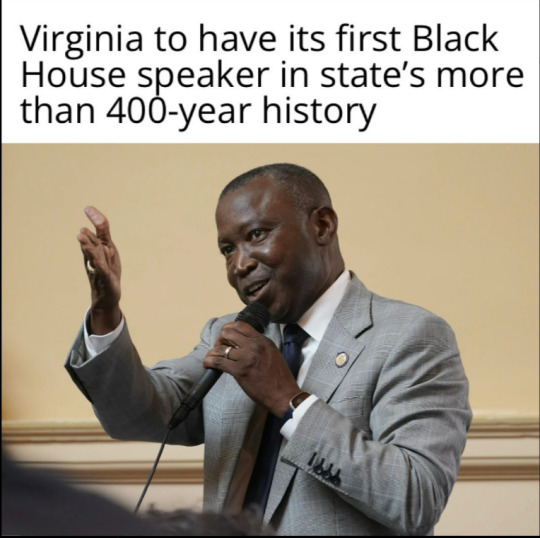
Delegate Don Scott will become 1st Black speaker of the Virginia State House after being unanimously elected. More than 400 years have led up to this historic moment! The full House of Delegates will vote to confirm him at the start of the 2024 legislative session. Congratulations!
11 notes
·
View notes
Text
In last year's off-off year election, Democrats flipped the House of Delegates – the lower chamber of the Virginia legislature and held on to the Virginia Senate. This was contrary to the predictions of various pundits. ProTip: When you vote, you win.
One result of the Democratic takeover of the House of Delegates was the election of Virginia's first ever African American speaker of that chamber.
The Virginia General Assembly unanimously elected Democrat Don Scott as house speaker on Wednesday, making him the first Black speaker in the Virginia House of Delegates' history.
Del. Scott approached the podium to cheers and a standing ovation as he took the oath of office and began his term as the leader of the House.
"My first immediate emotion is just gratitude. I'm very grateful," said Scott, tearing up as he thanked his 88 year old mother and his wife, watching from the gallery.
"The historic nature of this moment is not lost on me," he told the House.
"I pray that it is a proud moment for all of us, as we nominate Delegate Don Scott as our next speaker of the house," said Del. Luke E. Torian in his nomination speech.
"Over 400 years ago, people who looked like Delegate Scott gave their sweat blood and tears to build this Capitol," Del. Torian elaborated. "And I would say that is probably only right and fitting and appropriate that 400 years later, a person of color, an African American, whose ancestors helped to build this capital now stands to help lead this House of Delegates."
2023 was supposed to be a good year for Republican Gov. Glenn Youngkin (AKA: Trumpkin) but the voters decided otherwise.
Early in 2022, Scott took on Gov. Glenn Youngkin after the Republican set up a "tipline" for Virginians to anonymously report educators for teaching so-called "divisive concepts" like Critical Race Theory.
"What I've seen from his day one activities is not someone who is a man of faith, not a Christian, but someone who wants to divide the Commonwealth," Scott proclaimed to the Virginia House of Delegates, amid boos and jeers from the Republican side of the aisle.
Scott took it in stride. "I know the truth hurts. I don't want to make you cry, like saying 'critical race theory,' because I know it hurts your feelings."
Youngkin is term limited and can't run in 2025. Hopefully there will soon be a Democratic trifecta in the Old Dominion state.
For now: Congratulations to Speaker Scott! 🎊
#virginia#don scott#house of delegates#virginia legislature#democrats#election 2023#african americans#glenn youngkin#trumpkin
10 notes
·
View notes
Text
Vice Presidential Profiles: Thomas Riley Marshall (VP #28)
THOMAS RILEY MARSHALL
28th Vice President of the United States (1913-1921)
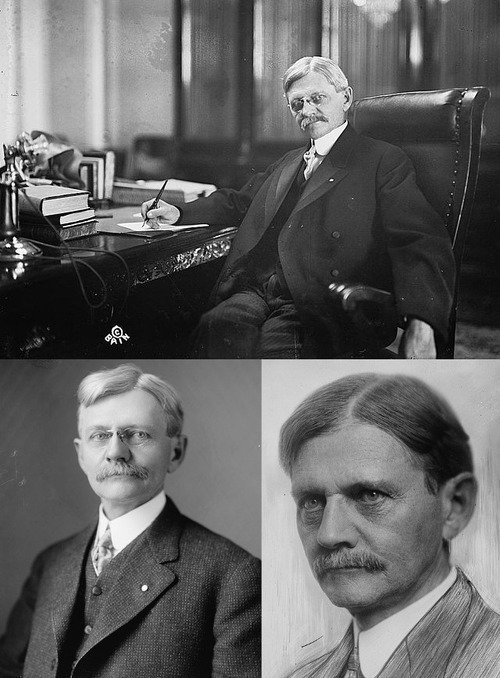
Full Name: Thomas Riley Marshall
Born: March 14, 1854, North Manchester, Wabash County, Indiana Religion: Presbyterian
College: Wabash College, Crawfordsville, Indiana
Career Before the Vice Presidency: Lawyer, Columbia City, Indiana (1875-1909); Unsuccessful Democratic candidate for Prosecuting Attorney of Whitley County, Indiana (1880); 27th Governor of Indiana (January 11, 1909-January 13, 1913)
Political Party as Vice President: Democratic
State Represented as Vice President: Indiana
Term as Vice President: March 4, 1913-March 4, 1921
Length of Vice Presidency: 8 years, 0 days
Age at Inauguration: 58 years, 355 days
Served: President Wilson (1st term and 2nd term)/32nd Administration (1913-1917) and 33rd Administration (1917-1921)/63rd Congress (1913-1915), 64th Congress (1915-1917), 65th Congress (1917-1919), and 66th Congress (1919-1921)
Post-Vice Presidential Career: Lawyer, Indianapolis, Indiana (1921-1925); Author (1921-1925); Appointed by President Harding to serve as a member of the Lincoln Memorial Commission (1921), Appointed by President Harding to serve as a member of the Federal Coal Commission (1922-1923)
Died: June 1, 1925, Washington, D.C.
Age at Death: 71 years, 79 days
Cause of Death: Heart attack
Buried: Crown Hill Cemetery, Indianapolis, Indiana
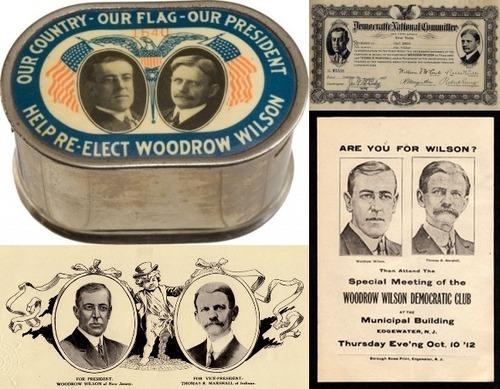
Random Facts About Vice President Marshall:
•On August 27, 1858, 4-year-old Thomas Riley Marshall accompanied his father, Daniel, to Freeport, Illinois, where Abraham Lincoln and Stephen A. Douglas were engaging in the second of seven debates which would go down in history as the epic "Lincoln-Douglas Debates". Little "Tommy" was too young to understand what was going on, but he had the best seat in the house. When Lincoln spoke, Tommy Marshall sat on the lap of Senator Douglas. When Douglas spoke, Marshall sat on the lap of Abraham Lincoln.
•While Marshall attended college, he wrote an article for the school newspaper about a visiting female speaker who gave a lecture on campus at Wabash College in Crawfordsville, Indiana. The woman felt Marshall had crossed the line and sued the future Vice President for libel in 1872. Each side lawyered up with notable legal representation. The plaintiff hired Lew Wallace, who was a Union General during the Civil War, later became Governor of the New Mexico Territory, and is best-known today as the author of Ben-Hur. Marshall found himself a lawyer in Indianapolis that was also a former Union General during the Civil War and who would later surpass even Wallace's political accomplishments. Marshall's lawyer was able to make it clear to the plaintiff that Marshall's comments might have been in poor taste, but they were likely true, and the case was dropped. Marshall's attorney was future President Benjamin Harrison.
•After beginning his own law career, Marshall fell in love with a young woman named Kate Hooper, but she died shortly after they were engaged to be married. Marshall was devastated by her death and began drinking heavily. Alcoholism took a toll on Marshall's health, career, and reputation until he finally married Lois Kimsey in 1895. Lois helped Marshall quit drinking, which gave him the focus to begin his political career. He didn't win his first political election until he was 54 years old.
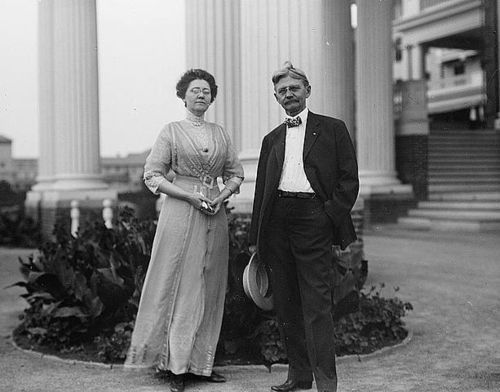
•In 1909, Marshall -- as Governor of Indiana -- installed the final brick to complete the Indianapolis Motor Speedway, the site of the Indianapolis 500.
•Marshall was not Woodrow Wilson's first choice as his Vice President in 1912. In fact, Marshall wasn't Wilson's choice as a running mate at all. Wilson had wanted the Speaker of the House of Representatives, Oscar Underwood of Alabama, to join him on the ticket, but Underwood declined the offer. The delegates of the Democratic National Convention decided upon Marshall, and Wilson was not pleased with the choice. He thought Marshall was a "small-calibre man".
•Despite his original doubts, Wilson stuck with Marshall in 1916 when many of the President's closest aides suggested dumping the VP in favor of another running mate. With their victory that year, Marshall became the first Vice President since John C. Calhoun in 1828 to be re-elected to another term.
•Thomas Riley Marshall is largely remembered because of his many humorous quotes poking fun at the insignificance of the Vice Presidency. When he was nominated as VP, Marshall pointed out that it made sense since he was a native of Indiana, "the mother of Vice Presidents, the home of more second-class men than any other state." A favorite Marshall story was one about a man who had two sons: "One went away to sea...the other was elected Vice President...he never heard from either one afterward."
•Other popular Marshall quotes:
-"I don't want to work [after retiring], but I wouldn't mind being Vice President again."
-"If you look on me as a wild animal, be kind enough to throw peanuts at me." (To a group touring the Capitol)
-"What this country needs is a good five-cent cigar."
•Despite Marshall's humor and frivolity, there was a serious Constitutional crisis near the end of Woodrow Wilson's Presidency. Wilson suffered a massive stroke in 1919 that virtually incapacitated him and kept him from fully discharging the duties of his office. For the last 18 months of of Wilson's Presidency, Wilson's wife and a handful of close aides carefully managed the Administration, keeping the truth about Wilson's health hidden. Today, a President in Wilson's condition would almost certainly need to hand the office over to the officer next in the line of succession, either temporarily or permanently. But the 25th Amendment did not exist during Wilson's time, and a group of Wilson confidants conspired to keep the truth from the rest of Wilson's Administration, including Vice President Marshall. Marshall didn't push to find out the extent of Wilson's illness; if he had, Wilson likely would have been forced to resign and Marshall would have become President. Most of the people close to President Wilson believed it would be disastrous to pass the reigns of government on to Vice President Marshall. But considering the track record of the Wilson Administration at the end of his Presidency, many historians believe that "President Marshall" could have helped get the Treaty of Versailles ratified and shepherd the United States into joining the League of Nations.
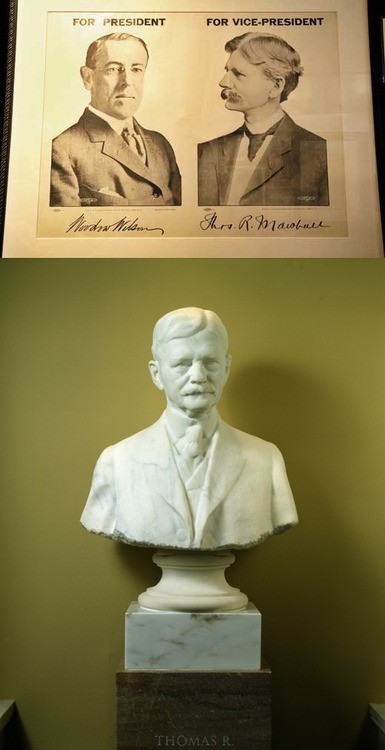
#History#Vice Presidential Profiles#Vice Presidents#Vice Presidency#Veeps#VP#VPOTUS#Vice Presidential History#Thomas Riley Marshall#Vice President Marshall#Thomas R. Marshall#Woodrow Wilson#President Wilson#Wilson Administration#Presidential History#Politics#Political History
6 notes
·
View notes
Text
Virginia Democrats beat back Gov. Glenn Youngkin’s effort to turn the state fully red by defending their state Senate majority in Tuesday’s General Assembly elections and flipping control of the House of Delegates.
. . .
On the House side, where Republicans had a 52-48 majority earlier this year, Democrats are now poised to elevate Minority Leader Don Scott, D-Portsmouth, to become the first Black House speaker in Virginia history.
7 notes
·
View notes
Text
Wheeling Tunnel on W.Va. Division of Highways Radar
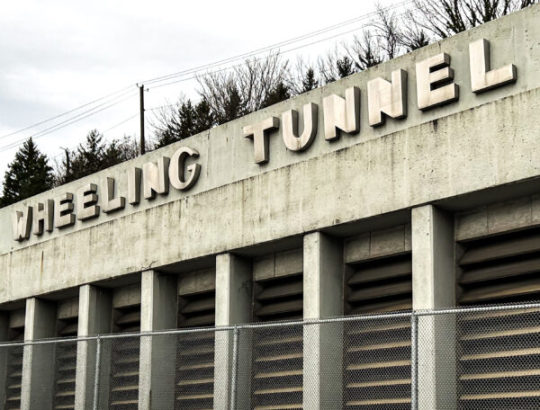
It remains a well-known fact Wheeling Tunnel wasn’t really fixed when it was allegedly fixed 14 years ago.
Crews with Velotta Construction pulled out of the Friendly City in the Spring of 2009 following a two-year, $14.5 million rehabilitation project on the two tubes. While the replacement of yellow tiles was one issue encountered by construction workers, the condition of the tunnel’s guts was far worse than expected.
Those shortfalls plus new issues with the electrical and lighting systems have District 6 Engineer Charlie Reynolds in conversations with Charleston officials concerning a new round of rehabilitations for the 57-year-old tunnel. Plus, the eastern façade of the tube systems is desperately in need of cleaning and rehabilitation.
“The front of that side of Wheeling Tunnel is gross. It’s the only thing that can be said. It’s gross. It’s dirty and there’s moss and mold up there,” Reynold said. “It really does need addressed as soon as possible. It’s that ugly.
The front facade of the east side of Wheeling Tunnel has been cleaned a few times in the past few decades, but it was left untouched during the recent I-70 rehab by Swank Construction.
“We have our people in Moundsville working on what needs done and then communicating that to the supervisors in Charleston,” he said. “There are more than a few issues with tunnels right now, so I am expecting the process to begin soon. I’m not sure how it will be performed because those decisions are made in Charleston, but there’s no way it will cause a closure. That’s not going to be necessary at all.”
The good news? The tunnel’s tiles are in great shape.
The bad news? The tunnel’s bones are aching and its arteries are clogged.
“The drainage does have to be addressed, and the lighting has to be upgraded. I’m sure a lot of the electrical system will be examined and repaired where necessary. With a lot of things, the time has come for upgrade,” Reynolds said. “It’s like maintaining your house. The time comes when you have to maintain and improve.
“There are no dates or anything like that yet, and there’s still a lot to talk about, but it’s coming,” the district engineer explained. “It’s a very important throughway for a lot of different reasons, so the tunnel need some attention.”
Former W.Va. Del. Charlie Reynolds resigned his District 6 seat to take the position with the Division of Highways.
Six Months on the Job
Reynolds submitted his resignation from the state House of Delegates to Speaker Roger Hanshaw on Oct. 6, 2023, to become the district engineer of a six-county region that includes the entire Northern Panhandle.
There are interstates, state highways, and thousands of miles of paved and unpaved roadways in District 6, and there are hundreds of bridges crossing creeks, streams, and the Ohio River. And there is one $32 million streetscape taking place in the middle of it all.
“The streetscape is a big job for the state and an important project for the city of Wheeling and everyone in it. There are other towns in the state that will want the same thing, I bet,” Reynold said. “That’s because downtown Wheeling is going to be a very attractive place in about a year and I think it’ll make that area very popular.
“There’s a lot to this position with the Division of Highways, and I learn something new every day on the job. There’s so much information that goes with every single thing we do. It’s amazing,” he explained. “I have a lot of fun every single day.”
Reynolds worked several years in the railroad industry – most recently as an inspector with CSX – before accepting the position with the Division of Highways.
“The people working at District 6 work so hard so that’s why I try to have fun with he job because it creates a better atmosphere. I’m a positive person and I think that might spread around,” he said. “I want the employees to have fun, too, but I know that’s possible all of the time. I mean, it is the Division of Highways, right?
“We all have bad days, and we all feel a little stress from time to time,” Reynolds added. “But I just had a coworker tell me that I make him laugh a lot, and as long as we’re getting the job done for the taxpayers, there’s nothing wrong with that.”
Read the full article
3 notes
·
View notes
Text
Robert Tait at The Guardian:
Republicans have identified recent college protests against Israel’s war in Gaza as the core of an election campaign narrative of chaos that they hope can be used to sink Joe Biden’s presidency.
The approach was bluntly crystallised by Tom Cotton, the Republican senator from Arkansas, in a recent television interview when he mocked the encampments that have sprung up in recent weeks as “little Gazas” and lambasted the president for a perceived failure to unequivocally denounce instances of antisemitism.
“The Democrats have deep philosophical divisions on Israel,” Cotton told ABC’s This Week programme. “That’s why you see all those little Gazas out there on campuses where you see people chanting vile antisemitic slogans … For two weeks, Joe Biden refused to come out and denounce it. That is the 2024 election.”
In fact, Biden did condemn antisemitism in a White House statement criticising the protests on 1 May, but also spoke out against Islamophobia and other forms of prejudice.
Cotton’s comments followed weeks of turbulence on university campuses across the US that have seen riot police forcibly dismantle pro-Palestinian encampments in widely televised scenes reminiscent of the anti-Vietnam war demonstrations of the 1960s.
His labelling of the encampments as “little Gazas” was denounced as dehumanising by some who lauded the protesters for drawing attention to the death toll of Israel’s continuing military offensive in Gaza. While relatively few Americans identify the war in Gaza as a vote-influencer, Republicans are seeking to capitalise on the vocal minority who are expressing discontent over it.
The conservative activist Christopher Rufo spelt out the approach in a recent article on Substack.
“This encampment escalation divides the Left, alienates influential supporters, and creates a sense of chaos that will move people against it,” he wrote. “The correct response … is to create the conditions for these protests to flourish in blue [Democratic-run] cities and campuses, while preventing them in red [Republican] cities and campuses.”
GOP intent was signalled by the visits of delegations, including Mike Johnson, speaker of the House of Representatives, to Columbia University – centre of the recent protests – and to George Washington University (GWU) in Washington DC, where protesters spray-painted graffiti and draped a Palestinian flag on a statue of the US’s eponymous founding father.
“It’s what the protests say about American political society and culture that the Republicans are trying to pick up on,” said Patrick Murray, director of the polling institute at Monmouth University.
“Biden has tried to make this election a referendum on what happened during the Trump administration, with his focus being ‘we don’t want to go back to the chaos of the Trump years.’ That argument can be undercut if people are seeing chaos from college campuses on their TV screens – Republicans are trying to say it’s no more stable and calm under Biden than it was under Trump.”
Republicans are also expanding congressional investigations into antisemitism allegations in the protests, an approach that has already reaped political dividends after the presidents of two elite colleges, Harvard and the University of Pennsylvania, were forced to resign following criticism of their testimony in previous hearings.
The right-wing are weaponizing the Gaza Genocide protests on college campuses to create an image that the Democrats are pro-chaos and anti-law and order.
#Campus Protests#Tom Cotton#Israel/Hamas War#Israel/Hamas Was Protests#Palestine#Israel#Christopher F. Rufo#Joe Biden#Gaza Genocide
6 notes
·
View notes